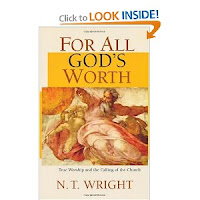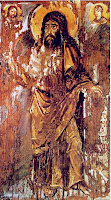
Sometimes I just need to read a good book on the cross. There are so many things that can distract us from that which is most important but the Bible says that the cross and resurrection of Jesus are matters of "first importance". This is a topic that no Christian (or no human for that matter) can afford to make peripheral.
Graham Cole's book (published by IVP) is a book on the atonement. In the introduction he lays out a variety of questions that he seeks to answer but essentially the book is about the cross, its saving significance and how it fits in the unfolding drama of God's redemption of his fallen creation.
Cole explains that there is a "big picture" of the Bible. He calls this big picture a divine comedy (or a U-shaped story). God has a plan to restore his created order (what Cole calls God's "atoning project" or "peacemaking project") and the atonement should be seen within this project. This, however, does not cause Cole to minimize the cross; rather, he sees the cross as central to this project. This, in my opinion, is the book's greatest strength. Cole manages to see the cross within God's larger drama without doing injustice to its centrality. In many books the larger drama takes center stage and the cross becomes one small part of that drama. Other times the cross is taken out of its context and it just becomes the way in which "I" get to heaven when I die.
Also helpful is the fact that Cole does not minimize sin. He acknowledges that the human predicament extends beyond a barrier to personal fellowship with God; Cole demonstrates how all our relationships are affected by the "rupture" even our relationship with the cosmos. But he never ignores the fact that all the problems in the world are
ultimately due to sin. He, therefore, quotes Carson with approval, "In sum, we find ourselves fighting the Bible's entire story line if we do not recognize that our deepest need is to be reconciled to God" (p. 83).
Popular today, especially in scholarly treatments of the cross, is to question the idea that penal substitution plays a central role, or any, in the biblical concept of atonement. Some pick a different models like Christus Victor (Christ's victory over evil) and place them at the center. Cole doesn't seem to choose a "central" model but he does say that a model like Christus Victor, "needs the explanatory power of substitutionary atonement" (p. 184).
At the end of the day, I didn't come away from this book feeling ready to win a debate. Rather, I came to see the glory of God's peacemaking project. God desires "shalom" for this world (peace with God, peace with others, and peace with the cosmos) and at the dead center of this project stands the cross where the second member of the triune God paid for the sins of the world so that he could have a people who would be apart of this project to the praise of his glory.




